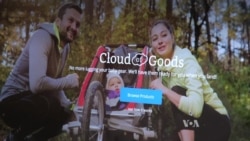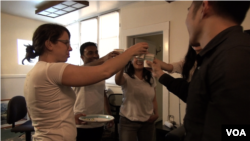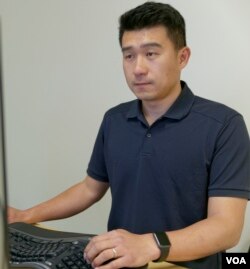America's high-tech center of Silicon Valley is growing, and much of its energy comes from immigrant entrepreneurs like Punsri Abeywickrema from Sri Lanka and Taiwan-born Gee Chuang. Both are founders of California startups, each at a different stage of development.
Abeywickrema is beginning to build a user base for his website, Cloud of Goods, and Chuang is expanding the user group of millions for the site Listia. Both companies are part of the the peer-to-peer “sharing” economy made famous by the ride-share giant Uber and lodging site Airbnb. Cloud of Goods and Listia, like the larger companies, operate in the expanding tech region around San Francisco.
A champagne celebration marked the first $500 in revenue at Cloud of Goods, which links local residents to tourists who need to rent household items that were too bulky to bring on their journey.
Developers in Sri Lanka program the website, but it's run from Abeywickrema's San Francisco apartment. The 10 unpaid employees discuss business at a weekly meeting and shared dinner, where the talk quickly turns from Japanese fried dumplings to website marketing.
Reallocating resources
The team, which includes technical consultants and a real estate agent, plans to build a multimillion-dollar internet company. “The idea was that there are a lot of resources that we all have accumulated in our homes, in our garages, in our closets, that are sitting idle, and how can we use this to make it better for everyone,” said co-founder Abeywickrema.
Between 2010 and 2012, he ran a similar site called Rentalic, a neighbor-to-neighbor rental. “It didn't work out,” he said, “but five years fast forward, I think there is a real opportunity to build that Airbnb-for-everything-else company.”
Co-founder Stacy Tran said the company is starting small, focusing “in the baby space first” and expanding slowly, “similar to how Amazon did it with books, and now to everything.”
The company now brokers the rental of baby strollers and car seats in San Francisco. Tran, an inveterate traveler, said the offerings later would grow to include kayaks, canoes and other adventure equipment as Cloud of Goods spreads its reach across the United States.
A key: Hiring good people
Listia is a web-based marketplace for used goods, including collectible vintage toys and rare coins, which are traded for Listia credits that can later be used to buy other things. The company was founded in 2009 by two Chinese Americans, Gee Chuang and James Fong, who met while they were students at Cornell University in New York state. Their operation is housed in a modern office in suburban Santa Clara, in the heart of Silicon Valley.
Listia has 9 million registered members, according to Chuang, and more than 100 million items have been traded on the site. Eighteen people work in the company's headquarters, and a smaller staff in Taiwan explores opportunities in Asia.
Chuang said getting good people is important for a startup, “people that know more than you, are better than you and can help what it is that you want to build.”
He and Fong “just love building things,” Chuang said, “so at the start, it doesn't feel intimidating. We just want to build it and see what happens.”
He said challenges include mediating disputes among the site's users, detecting fraud and overcoming the hurdles of running a business. Among Listia's challenges was a 2014 investigation by the U.S. Labor Department following complaints by online moderators who were paid with Listia credits.
The founders said they didn't realize that moderators, who commonly are found on websites, could be considered employees, “but after we got much larger,” Chuang said in a statement, “we found out that these activities should be classified as paid work.” He said the company paid back wages and hired the moderators as part-time workers.
Starting is tough
Starting an online business can be difficult. “It's pretty hard to get them off the ground,” said analyst Neal Gorenflo of the news and advocacy site Shareable, noting it is especially hard for companies that require a change of behavior, as do many in the sharing economy.
“While some of these companies have grown quickly,” Gorenflo said, “it often took them a few years to find how to make it happen.”
Abeywickrema of Cloud of Goods acknowledged that starting a business takes time, but the tech economy is booming — and from the industrial parks along the California freeways to downtown San Francisco, startups are attracting energetic people from around the world.
“All that different expertise, different skill sets, different talents mix here together, and that is the right recipe for a successful company,” he said.
















